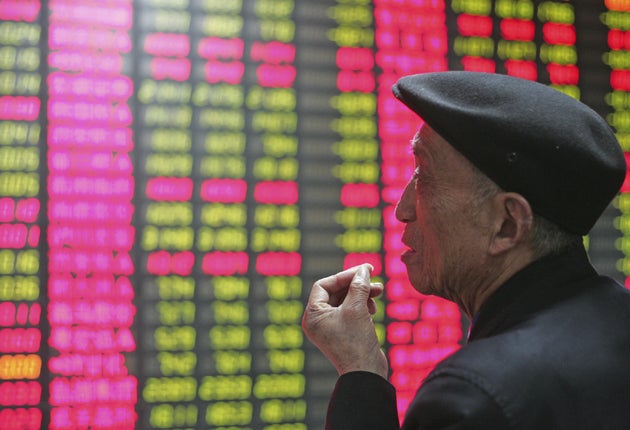Chinese love affair may end in tears
If you are thinking of investing in the Far East, tread carefully, warns Chiara Cavaglieri

Your support helps us to tell the story
As your White House correspondent, I ask the tough questions and seek the answers that matter.
Your support enables me to be in the room, pressing for transparency and accountability. Without your contributions, we wouldn't have the resources to challenge those in power.
Your donation makes it possible for us to keep doing this important work, keeping you informed every step of the way to the November election

Andrew Feinberg
White House Correspondent
It's supposed to be the one long-term banker for investment returns: China. Its rapid growth story and expectations for the rise of the East are almost limitless. While many see a golden investment opportunity and are keen to pile in before the end of the ISA season, are there warning signs that China is not such a sure-fire bet?
China investment hit the headlines when renowned fund manager Anthony Bolton returned to head up the Fidelity China Special Situations investment trust fund. A lot of money is expected to go into China; this new investment fund alone is aiming to raise a £630m from investors.
"If China follows the path of Korea 20 years ago, we'd expect to see retailers, education companies and the technology sector, which are all exposed to the local economy, doing well," says Mick Gilligan, head of research at stockbroker Killik & Co.
He adds that there are two key ways for investors to play it. "One is to get exposure to companies that are listed on Western stock markets but have an in-road to China, through a fund such as M&G's Global Basics. Or, you can buy stocks in companies that will benefit directly from consumer spending in China," he adds.
The attraction of emerging markets such as China is clear. These countries have rapidly growing populations, with an increasing wealth and desire to spend. Infrastructure spending is yet another attraction, with governments investing in railways and roads to strengthen its economic growth. Indeed, China saw GDP growth of 8.7 per cent in 2009 and the World Bank has predicted growth will remain healthy at 9.5 per cent for 2010.
However, this forecast was not without caution, and the bank has recommended allowing the currency, the yuan, to appreciate, in order to manage inflation expectations and reduce the risk of a property bubble. This is amid ongoing criticism, particularly in the United States, that China has been keeping its currency artificially low to boost exports. Investors therefore need to consider what might happen if the yuan does rise.
"Will China's huge trade surpluses start being eaten into? Will a new emerging market appear and become a cheaper alternative than China?" asks Ben Yearsley from independent financial adviser Hargreaves Lansdown.
Some experts are also raising concerns that China could be headed for a crash, arguing that a great opportunity can only remain that way as long as too many people don't try to take advantage of it. In light of this, they warn that the Chinese economy is overheating and may become a "growth trap" for investors.
"The trap is created by excessive valuation of the growth potential which typically arises when the story is both very good and very well known," says Stuart Fowler, director of IFA firm No Monkey Business. "Momentum may create further opportunities, but this is a dangerous game for individual investors," he adds.
Long-term prospects are far more reassuring, so investors with an eye on China should be prepared to part with their money for a minimum of five years. But remember, historically, the Chinese stock market has not moved in line with the country's wider economy. In fact there have been times when the market has been in a downward spiral yet the economy has powered ahead.
There is also the exchange-rate risk to consider when investing outside the UK which can severely affect the underlying performance of any fund.
Finally, the political risks associated with an emerging market cannot be ignored, and never more so than with a country like China. Relations between China and its biggest export market, the US, have become decidedly frosty of late over Taiwan and Tibet, as well as economic issues. Google's recent announcement that it has shut down its Chinese search engine and switched its facility to Hong Kong only serves to highlight this fact.
Despite the potential perils, many investors are dismissing any warnings of a bubble and look set to continue their love affair with China, which many IFAs warn is a risky strategy.
Mr Yearsley says: "The reality is, although the long-term outlook for markets such as China is great, there may well be hiccups on the way – and the problem is not knowing when these hiccups will occur."
Subscribe to Independent Premium to bookmark this article
Want to bookmark your favourite articles and stories to read or reference later? Start your Independent Premium subscription today.
Join our commenting forum
Join thought-provoking conversations, follow other Independent readers and see their replies
Comments